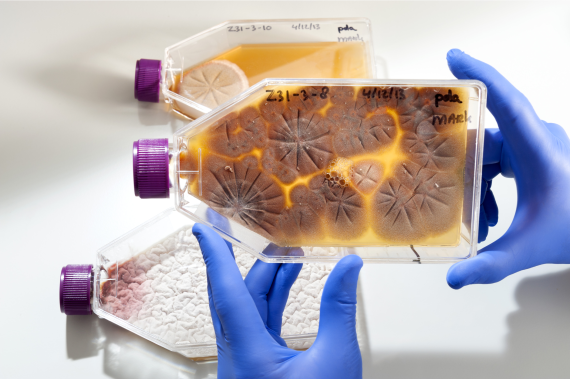Photo: Wageningen Food & Biobased Research
Biodegradable plastics are made out of organic acids such as lactic acid. The disadvantage of the current production technique is that the bacteria that are used for this grow poorly in an acidic environment. This makes the process expensive and leads to byproducts such as gypsum. The researchers developed a genetically modified fungus which can cope with an acidic environment and can therefore convert biomass into lactic acid without byproducts.
Because it is not known which genes make the fungus acid-proof, the researchers looked for a micro-organism which naturally thrives in an acid environment. The winning fungus was Monascus ruber. This fungus does not naturally produce lactic acid, but the researchers solved that by genetically modifying it. It then turned out, however, that the fungi preferred the lactic acid to the sugar they were actually supposed to grow on. ‘By cultivated the fungi under particular conditions, repeatedly selecting the ones which grew best on sugar, we succeeded in ‘training’ them, as it were, to use sugar,’ says project leader Ruud Weusthuis.
Gerrit Eggink, account manager of the project, considers the results promising. ‘The lactic acid production of these fungi is twice what we have seen up to now with other micro-organisms which grow in highly acid conditions.’ An added advantage is that the fungus is safe: other strains of this species are used in the production of red rice. This paves the way to further development. A pilot with the fungi will be starting soon at Total in the United States.
Weusthuis is proud of the way the project has gone and the smooth collaboration between Wageningen Food & Biobased Research and the university groups Bioprocess Engineering, Microbiology, and System and Synthetic Biology. ‘I reckon it’s a nice example of One Wageningen.’

